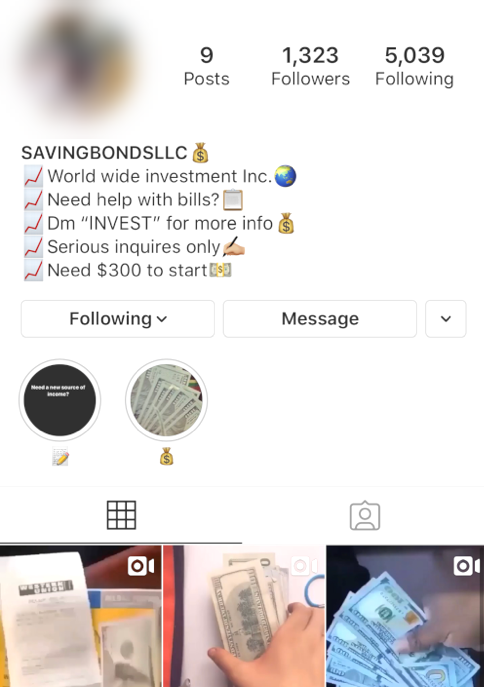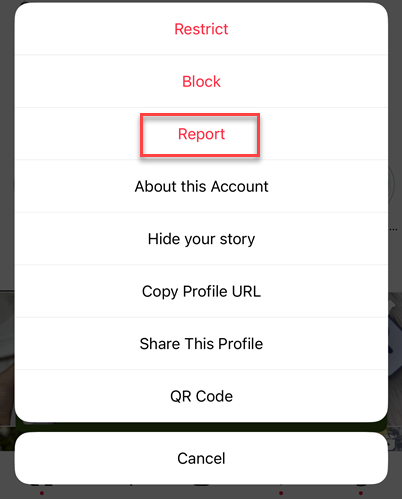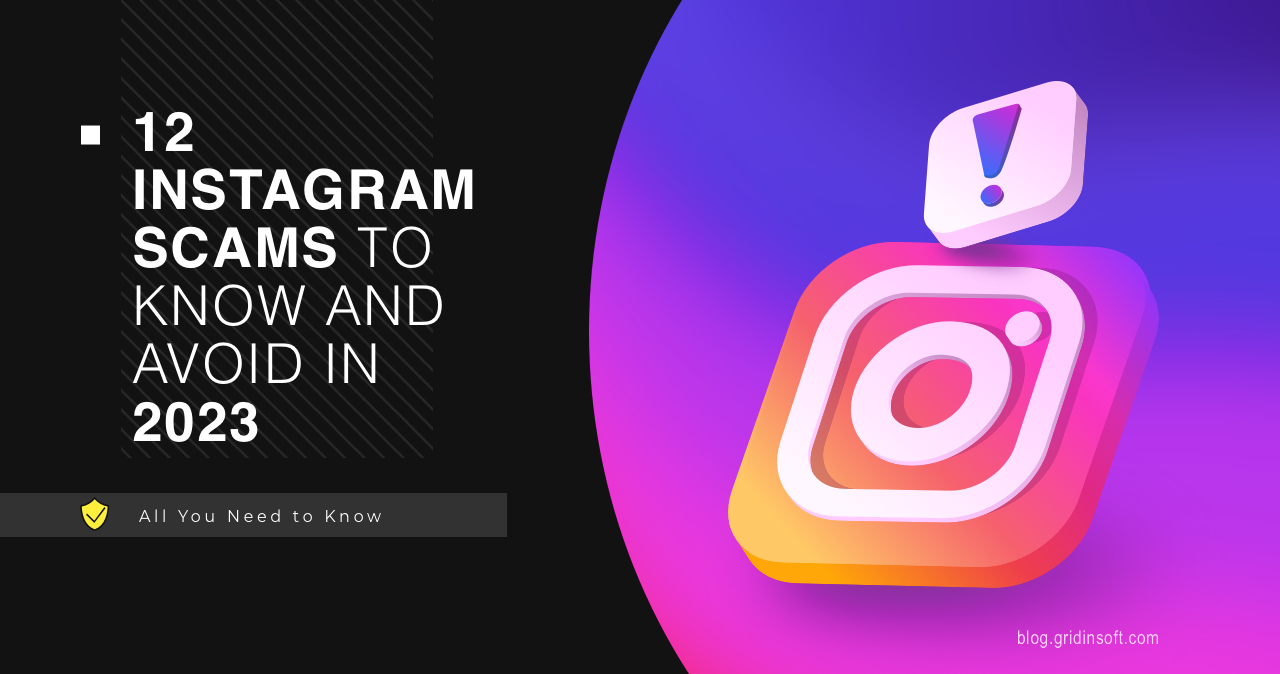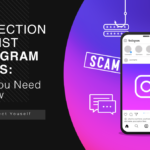Nowadays, it’s hard to find someone who has not heard of Instagram. Whether you use it to see what’s new with your friends or to kill time watching cat videos, the app has just about everything. However, besides entertaining videos on Instagram, some things can negatively impact your financial health. Cybercriminals couldn’t get past this service and are using the app to scam people online. Today, we will look at the most common and relevant Instagram scams and find out how to detect, report, and avoid them.
The most common types of scams on Instagram
Since Instagram was founded, mobile scammers have devised many ways to scam users. From seemingly lucrative investment offers to fake job offers, scammers can try to carry out their dirty plans differently. Here are the most common and relevant scams on Instagram today that you should avoid:
Instagram Influencer Scams
While many legitimate influencers on Instagram exist, not all influencers are the same. Some are fake accounts created to trick gullible users. Instagram influencer scams include accounts with fake followers and likes, racy profile pictures, and promoting investment opportunities or financial services. In some cases, it is possible that the account was once real but was hacked.
Yeah. I’m sure this Instagram account will really help me succeed financially. pic.twitter.com/QGZdlvazEC
— Gaetano DiNardi (@gaetano_nyc) April 14, 2022
Phishing Instagram Scams
Like classic phishing attacks, Instagram phishing scams come with a sense of urgency. You may receive an urgent direct message (DM) or email telling you to take action, or your Instagram account will be “suspended”. In such messages, scammers impersonate the official Instagram support account and try to convince users that your account is in danger. Such attacks are often accompanied by requests for personal information. This information may include your username and password and alerts that you need to check your account for “suspicious activity”. To avoid this, it’s critical that you keep all account information private from others. And remember, Instagram will never send you a message about your account.
Fake job scams
Unfortunately, many people lost their jobs during the pandemic. Fraudsters have tried to take advantage of the situation by promoting fake job postings on Instagram, and they’ve partly succeeded. Phony job scams often include messages from fake recruiters, links to artificial job applications, and requests for your personal information. However, once you give a so-called recruiter your confidential information, they can use it to steal your identity, emptying your financial accounts. In some cases, it has ended up taking over your Instagram profile.
Music promotion scams
This scam is much more specific and can apply almost exclusively to musicians. If you share music on Instagram, you may fall victim to music promotion scams. The music promotion scams usually start with DMs from fake music promotion accounts. If so, the scammers may ask for money in exchange for a promotional post, claiming they can help increase your music streams. Sometimes, these accounts have many subscribers, views, and likes. At first glance, it may seem like there are thousands of people listening to your music. However, these are often bot accounts. Hence these Instagram views will not lead to new listeners on streaming platforms.
Instagram Ambassador Scams
Fake sponsorship scams (sometimes called Instagram ambassador scams) on Instagram also use fake or hacked accounts. However, these accounts pretend to be legitimate brands instead of posing as an influencer. Similar to the previous points, signs of sponsorship scams start with DM from fake brand accounts, which often ask to pay them to advertise. They may also ask for your personal information and, in some cases, offer to be an ambassador. They may promise a free trip or discounted travel, such as for a private meeting or photoshoot. Such situations are often fake and are only used to steal your personal and financial information. All such contacts require a thorough analysis.
Lottery and giveaway scams
Another standard Instagram scam scheme is a fake lottery and giveaway. Typically, these scams are designed to steal your information by convincing you that you have won a prize or contest. First, they congratulate you in a direct message and tell you that you have won an award. Next, scammers ask for your personal information to send you a prize. Sometimes they ask you to follow a link that redirects you to an insecure website. Rascals sometimes hijack real accounts or pretend to be someone running a legitimate giveaway. That’s why it’s essential always to be careful and keep personal information private from someone you’re not sure about.
Crypto scams
These days, it’s almost impossible to be on the Internet without hearing about cryptocurrency. Unfortunately, scammers here also managed to take advantage of the situation to scam Instagram users. The main signs of a crypto scam on Instagram can be considered any DM from extraneous accounts is claiming they can make you rich. In doing so, they ask you for payment or personal information. The only thing that can happen to your investment if you contact such scammers is that you lose it.
Romance scams
Romance scams can make you and your account vulnerable to hackers. In addition, these scams can be frustrating, often causing emotional and financial pain. Here, too, it’s all classic, DM from a fake account, lengthy romantic communication, then requests for payment, gifts, etc. In such attacks, scammers use the most sophisticated lies and social engineering to manipulate you and extract your money and personal information.
Investment scams
Similar to crypto scams, many scammers target those looking for extra money. They will send DMs and offer investment opportunities, so it’s best to be wary of any cash exchange or get-rich-quick schemes. The red flags of this scam include DMs from people with luxury lifestyles and promises of wealth and financial success. In return, you will be asked for an initial investment, often using mobile payment apps. However, once the scammer gets your initial investment, you will never hear about him again, and he will continue to try to do so with others. Alternatively, the crook will convince you to make another investment, which is promised to cover the previous losses.

Fake product scams
And the most massive scheme is the counterfeit items and online shopping scams on Instagram. Such scammers often buy a promoted Instagram account with many followers, which makes them more convincing. The red flags of this scam are
- Fake products ads
- Heavily discounted prices compared to other stores
- Links to questionable sites
- Requests for personal information to complete the purchase
Not only that, once you’ve given the scammers your personal information, you could lose access to your Instagram account, could get a fake version of the product you ordered, or, even worse, they could steal your identity.
Paid subscription scams
Another scam you should look out for is paid subscription scams. Scammers may offer access to genuine subscription services at a reduced price in these scams. The red flags, in this case, are account advertising of a lifetime or discounted admission to subscription services, requests for payment and personal information, and links to fraudulent sites. Usually, these are popular subscription services such as Netflix, Spotify, or Xbox Live. Again, we recommend only subscribing to a subscription service on the official website.
Blackmail scams
Sometimes hackers can break into an Instagram account and try to blackmail you as a form of harassment or for financial gain. This is all accompanied by threats to reveal personal information and claims that the hacker has access to your files. However, the hacker may not even have any information he claims to have. These are common attempts to scare you into complying with their demands.
What to do if you were scammed on Instagram
To protect yourself and your Instagram account, follow these steps:
- Don’t reply or click on links. Whenever you receive fraudulent messages on Instagram, the best solution is not to respond or click on any links.
- Block the account. The scammer won’t trouble you if he realizes you won’t fall for his tricks. To block someone on Instagram, click on their profile, tap the three-dot icon in the top right corner of the screen and select “Block.”
- Report the account. Follow the same steps above, but select “Report” and follow the instructions on the screen to let Instagram know the specifics of the scam.

This way, you can protect yourself and help Instagram prevent fraud with these accounts.
How to avoid Instagram scams
To reduce the likelihood of fraud, follow these cybersecurity tips:
- Use common sense. So it is if you’re offered a deal that seems too good to be true. Always be cautious and use common sense when communicating with other Instagram users.
- Enable two-factor authentication. Using 2FA can help prevent outsiders from accessing your Instagram account, even if they gain access to your password.
- Look for the confirmation check mark. If someone texts you from an account claiming to be an influencer or brand account, look for the blue verification check mark next to their name. Luckily, anyone on Instagram can’t buy it for $8, and it’s probably a fraudulent account if there’s no checkmark.
- Don’t link your Instagram with third-party apps. In some cases, third-party apps may request access to your Instagram account. Before you say yes, research and ensure the app is legitimate, as some apps can collect and sell your data.
- Make your account private. If you set your Instagram account to private, then only approved users will be able to view your account. You can do this by clicking “Settings,” selecting “Privacy,” and then turning on the “Private Account” feature.
- Use strong passwords. If you don’t do this item, all others will go to waste. So to keep your Instagram account as secure as possible, it’s essential to use a strong password. This can help prevent scammers from hijacking your Instagram account through password spraying or other tactics.
- Never click on suspicious links. In many cases, Instagram scammers may try to direct you to a malicious website. To avoid this, only click links you’re sure about.
- Shop only from verified accounts. Since Instagram added the shopping feature, many companies have started advertising and selling products online. Unfortunately, scammers pretend to do the same. To be safe, buy only from verified accounts with a blue check mark.
- Use an antivirus app. You can install an antivirus app on your mobile device for an extra layer of protection. This will help protect your phone from mobile threats, including viruses, malware, and spyware.
By following these tips, you can browse Instagram without worrying about scams.





